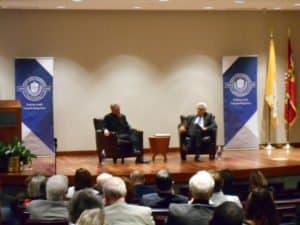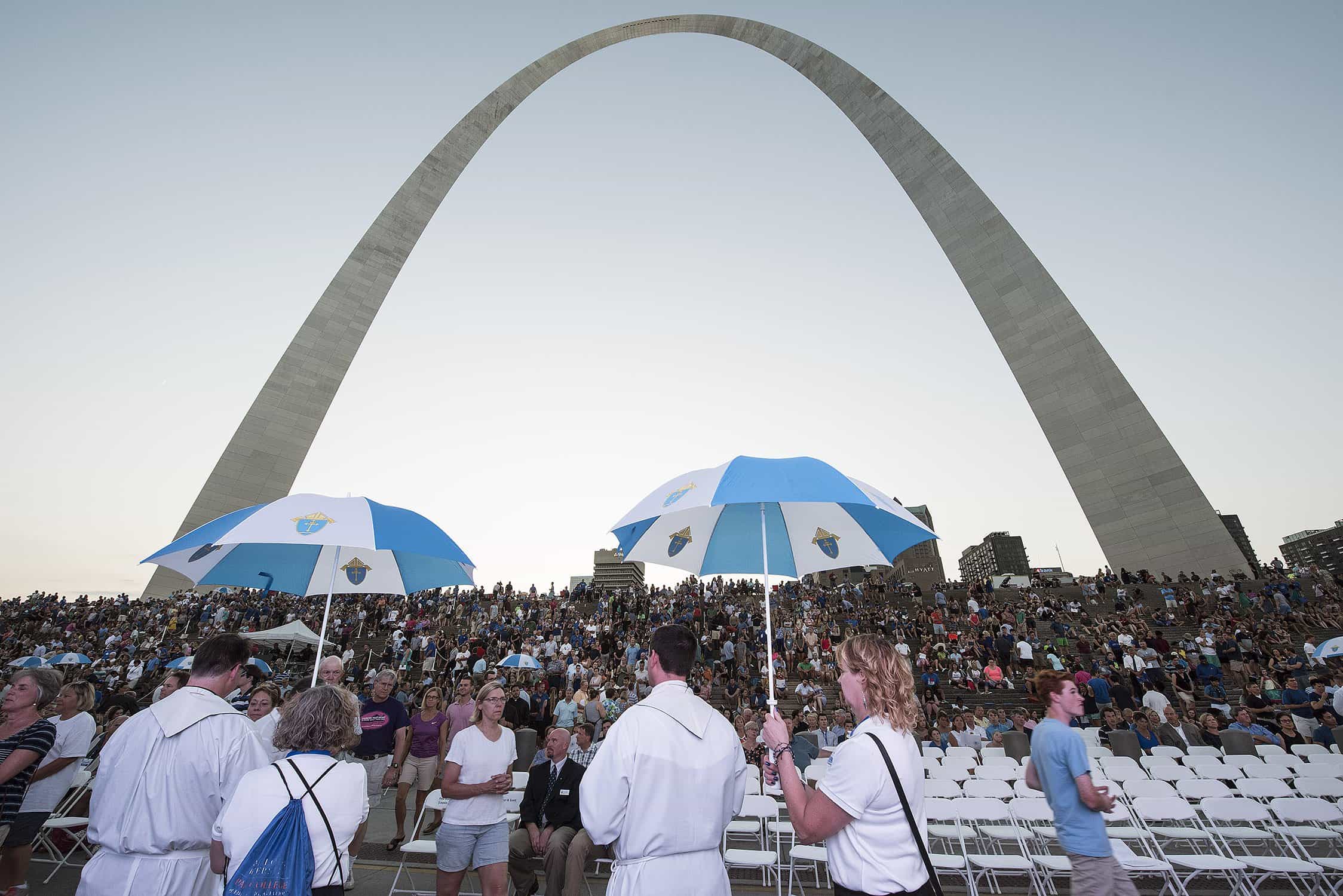Where is Jesuit higher education in 2017?
In Saint Louis this past week, two events converged to ask that question: Saint Louis University’s Bicentennial kick-off, and a conference on the 50th anniversary of the Land O’ Lakes Statement.
As Saint Louis University (SLU) begins its year-long celebration of its bicentennial with this past Saturday’s Mass under the Gateway Arch, it can contemplate with gratitude its first 200 years. Yet as the SLU community looks toward its future, an obvious question arises: what is it to be a Jesuit university in the 21st century? What is the purpose of an institution like SLU today?
The history of the Land O’ Lakes Statement has answers to such questions.
The Statement, written in 1967 by a group mostly composed of Catholic university leaders, called for Catholic universities to rise to the academic standards of other universities. There is no question that Catholic schools have embraced that call for the better, in many cases becoming premier institutions of higher learning.
But as one surveys the landscape of higher education in 2017, one has to wonder: do Catholic universities still want to be like other universities? Do we welcome escalating tuition costs, hostile relations between faculty and administration, or the commodification of education as a “product” to be sold to “consumers”? Should we embrace an unhealthy preoccupation with college sports that are increasingly professionalized, battles over trigger warnings and safe spaces, polemics concerning academic freedom and free speech, controversies about just labor practices and adjunct salaries, or struggles with campus sexual assault and hate speech? Today’s university is all too often a place of division and exclusion. Is that who we want to be?
What a shock, then, to read this: “A university is an intellectual community.”
Yet that was indeed the assertion of Father John Jenkins, C.S.C, president of Notre Dame. Father Jenkins, who spoke with SLU President Dr. Fred Pestello at the opening night of the conference, recently wrote a judicious evaluation of the Statement in America Magazine.

Father Jenkins and Dr Pestello speak at SLU in September 2017.
As Jenkins notes, the Statement is remarkably confident in its message. Reading the Statement, for instance, one is bowled over by the boldness with which it treats the university as a community: a place where theologians foster “a constant discussion within the university community in which theology confronts all the rest of modern culture and all the areas of intellectual study which it includes”; where scholars in other disciplines engage with “interdisciplinary problems and relationships” that help elucidate the “philosophical and theological dimension to most intellectual subjects”; and where “students will individually and in small groups carry on a warm personal dialogue with themselves and with faculty.”
The result will be a “creative dialogue [that] will involve the entire university community,” fostering“a community of learners or a community of scholars, in which Catholicism is perceptibly present and effectively operative.”
This language sounds a bit grand. But it helps show us where we are. The university as an “intellectual community”? Sure, universities are intellectual. But are they communities? We hardly have any communities in our time. Why should universities be any different?
Yet universities as communities are precisely what we need. In his homily beneath the Gateway Arch, Father Ron Mercier, SJ extolled the history of SLU. He also pointed out the obvious: “But the promise of the harvest remains unfilled at this point for so many.”
In a world with so much hurt and violence, and in such need of healing and reconciliation, clearly our mission as a country and as a society is not done. And we need universities more than ever to take seriously the challenges that obstruct that reconciliation. Perhaps universities renewing their mission to society would help them see how they themselves can become communities again. Indeed, would anything else?
At the risk of sounding pompous, I think a 2017 Land O’ Lakes Statement would urge Catholic universities to be a prophetic witness for other higher education institutions: a prophetic witness for community and reconciliation. It would seek not to replicate the success of other schools, but rather urge them to labor with us toward deeper and more meaningful forms of success. To quote Father Mercier again: “With all the great work already done, the call still comes out for us – and those who will come after us – to labor in the vineyard so that its promise – God’s desire – may be fulfilled.” We need to bring more laborers into that vineyard.

SLU’s Bicentennial Mass alongside two great Saint Louis landmarks: the Gateway Arch and the Mississippi River.
To take this task of reconciliation seriously, however, would require universities to discover more deeply what it means to be for and with others – including the “others” on our very campuses. That cannot be something we do as a side project. It has to be deeply ingrained in everything we do. Inspired by the Jesuits’ General Congregation 36, that effort would embrace the intellectual and practical task of reconciliation at all levels: reconciliation with God, with other humans, and with creation.
That effort, moreover, cannot involve a false choice between social justice and the life of the mind: the desire to be positive agents of political and social change should not lessen our commitment to academic excellence. To the contrary, a focus on the real and pressing needs of our society ought to draw out the best in all of us as an intellectual community.
This is my wish for SLU on its 200th birthday: that it accept the present challenges posed by its noble mission, inspiring others to imitate its witness. And daunting though the task may be, Father Mercier reminds us that we are not alone: “Yet, we are indeed laborers of the midday in all our capacities; many have labored before us and many will follow…”
***
Images courtesy Saint Louis University.


